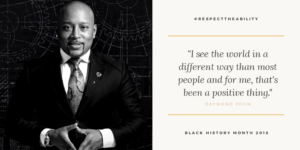
“I see the world in a different way than most people and for me, that’s been a positive thing.” – Shark Tank star and businessman Daymond John, who has Dyslexia
View 2021 Release: https://www.respectability.org/2021/02/black-history-month-2021.
Rockville Md., Feb. 5 – As we celebrate Black History Month, which takes place every February, RespectAbility recognizes the contributions made and the important presence of African Americans to the United States. It is important to note this includes more than 5.6 million African Americans living with a disability in the U.S., 3.4 million of which are working-age African Americans with disabilities. Therefore, we would like to reflect on the realities and challenges that continue to shape the lives of African Americans with disabilities.
Only 28.7 percent of working-age African Americans with disabilities are employed in the U.S. compared to 72 percent of working-age African Americans without disabilities. This is in line with the rest of the country, with fully one-in-five Americans having a disability and just 30 percent of those who are working-age being employed, despite polls showing that most of them want to work. This leads to approximately 40 percent of African Americans with disabilities living in poverty compared to 22 percent of African Americans without disabilities.
For many of the 1,199,743 black students (K-12) with disabilities in America today, the deck is stacked against them. Frequently “invisible disabilities” such as ADHD are not diagnosed and students do not get the supports they need to achieve. Frustrated, they can act out and become suspended. African American students with disabilities are disproportionately impacted by suspension in schools, with more than one in four boys of color with disabilities — and nearly one in five girls of color with disabilities — receiving an out-of-school suspension.
Studies show that when students miss too many days, either for being truant or just being absent, they get so far behind in class that it can lead to them dropping out of school. As documented in Disability & Criminal Justice Reform: Keys to Success, this can lead to the school-to-prison pipeline. Today there are more than 750,000 people with disabilities behind bars in America. Many of them do not have high school diplomas, are functionally illiterate and are people of color.
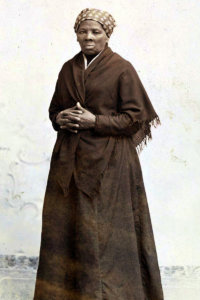
Harriet Tubman did not let her epileptic seizures stop her from risking her life to free slaves through the underground railroad.
Overall, only 65 percent of students with disabilities graduate high school compared to 84 percent of students without disabilities. However, only 57 percent of black students with disabilities graduate high school compared to 74.6 percent of black students without disabilities.
Some celebrities and business leaders are using their voice to share their stories, educating people about both visible and invisible disabilities. They are defying the statistics and have remained highly successful with their disabilities. These role models make a big difference in setting high expectations for youth with disabilities. People with disabilities of all backgrounds can be amongst the highest achievers on earth. Harriet Tubman had Epilepsy, actress Halle Berry lives with diabetes, business leader and Shark Tank superstar Daymond John is dyslexic and Stevie Wonder is blind. Each of them is a positive role model for success. They are perfect candidates for RespectAbility’s #RespectTheAbility campaign, which is shining a light on individuals with disabilities who are succeeding in their chosen careers.
- Muhammad Ali—Dyslexic Role Model Fought in the Ring and for Racial and Social Justice
- Maya Angelou, Legendary Poet and Civil Rights Activist Who Had Disability, Inspires Generations
- Halle Berry: Living with Disability While Taking a Stand against Domestic Violence
- Olympic & Disability Champion Simone Biles Makes History While Mesmerizing Many
- Lois Curtis: One Woman with Disabilities Fight for Freedom For All
- Missy ‘Misdemeanor’ Elliott ‘Works it,’ Serves as Role Model for Young Women with Disabilities
- Deafblind Lawyer Haben Girma Advocates for Disability Rights
- Whoopi Goldberg: Talented Actress, Comedienne and Talk Show Host Lives with Dyslexia
- First Deaf African American Lawyer Claudia Gordon, Anti-Discrimination Advocate
- Daymond John: Clothing Entrepreneur and “Shark Tank” Star with Dyslexia
- Actress with Cerebral Palsy Diana Elizabeth Jordan is Veteran of 17 Shows, Shorts and Movies
- Solange Knowles: Role Model for African American Performers with Disabilities
- Clarence Page Credits ADHD with Making Him a Better Journalist
- Harriet Tubman, Legendary Poet and Civil Rights Activist with Epilepsy, Inspires Generations
Our nation’s economy is strongest when it is inclusive of the value that diverse talent brings to the workplace. These celebrities are making a difference in how audiences perceive disability. However, companies including Amazon, Starbucks, Pepsi, J.P. MorganChase, Walmart and others exemplify these values and have specific programs to hire, cultivate and promote people with disabilities. What these businesses have found is that employees with disabilities are loyal, successful and help them make more money.
The celebrities mentioned above are especially important to acknowledge during Black History Month. However, their work should be valued and appreciated year-round. RespectAbility will be highlighting additional African American celebrities, as well as those who have made important policy advancements, with disabilities throughout the entire month.
View https://www.respectability.org/category/respecttheability/ for more.


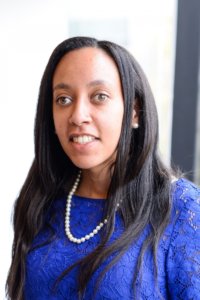
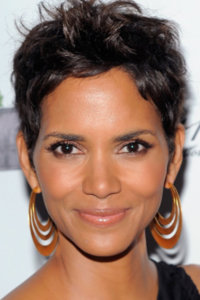
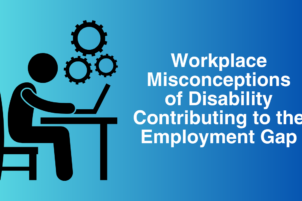

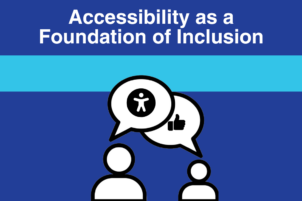



Thank you for posting this and for all you do! I’ve already shared this with our (global) Special Populations audience. As a woman of color with a (newly acquired) disAbility, I’m a triple threat to many and asset to some. In either case, I use my Intersection of #SuperPowers for good. As such, I’d like to SHARE a similar Respectability article for (differently-abled) Women’s HerStory Month on my social media platforms.
~ Yvette P.
Please consider updating your list to include US Olympic Hall of Fame Olympian Wilma Rudolph.
You might want to look up Dr. Glenn Anderson the first African American Deaf person to earn a doctorate degree. Dr. Anderson is a truly extraordinary gentleman and you would certainly enjoy interviewing him about his remarkable career. Dr Shirley Allen was the first Deaf woman to earn her doctorate. Also the remarkable McCaskill sisters, Drs. Carolyn and Angela McCaskill. Dr. Carolyn McCaskill is one of the co authors of the book Black ASL which gives a historical account of the sign language used among Black Deaf people during segregation. I believe they are the first Black Deaf siblings to earn doctorate degrees.
Thank you. This is awesome!